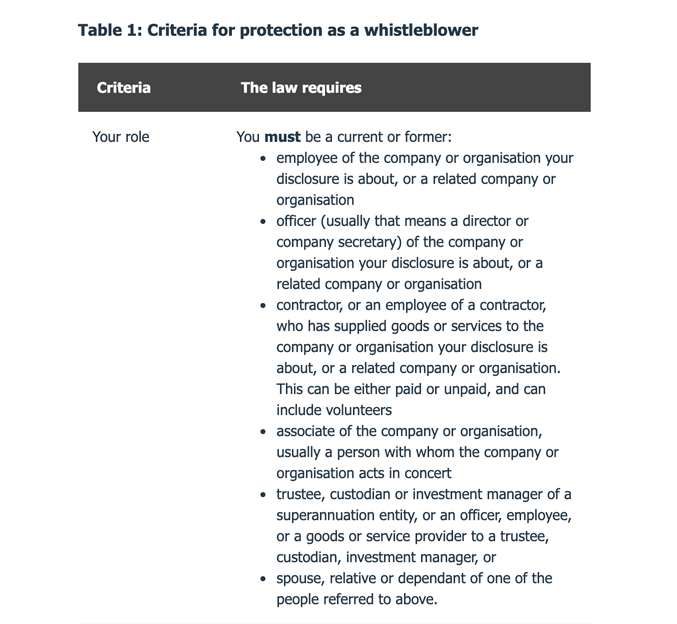Whistleblower Policy
Published
Whistleblower Policy
In 2019, the Australian Federal Government passed new whistleblower legislation to ensure that people have the ability to anonymously report unethical or illegal behaviour occurring in Australian businesses.
Companies that fail to follow the new federal whistleblower laws could face penalties of up to $10.5 million. You need to distribute the work policy and record acknowledgement of the policy, and the policy must always be available to employees.
You also need to have a way for an employee to report that is both readily available and anonymous.
For comprehensive workplace protection, it’s also crucial to implement related policies such as a Workplace Health and Safety (WHS) Policy to ensure overall employee safety and compliance.
What’s included in this Whistleblower Policy template?
We can help you get started with our free policy and guide.
In this Whistleblower Policy template, we cover:
- The protections available to whistleblowers;
- How the company will support whistleblowers and protect them from detriment;
- How the company will investigate the information whistleblowers disclose;
- How the company will ensure fair treatment of employees who are mentioned in protected disclosures and;
- How policies will be made available to officers and employees of the company.
Furthermore, implementing a Workplace Bullying and Harassment Policy can help foster a safer and more supportive environment for your employees.
The deadline to implement a whistleblower policy for qualifying companies is 1 January 2020.
Disclaimer: While due care has been taken in preparing the document, no responsibility is accepted by the author for the accuracy or suitability of the information contained. All liability is expressly disclaimed for any loss or damage which may arise from any person relying on, using or acting on any information contained therein.
What are the new Whistleblower laws?
In March 2019, the Australian Federal Government introduced new changes to the whistleblower legislation. In April 2019, these changes were enacted known as, ‘The Treasury Laws Amendment (Enhancing Whistleblower Protections) Act 2019 (Act)‘.
This passed both houses of Parliament and commenced on 1 July 2019. The new Act aims to encourage ethical whistleblowing and discourage unethical, illegal, corrupt, fraudulent and other undesirable conduct, while holding employers accountable for protecting eligible whistleblowers.
The Act makes significant changes to the existing Corporations Act 2001 (Cth) and the Taxation Administration Act 1953 (Cth).
These changes will affect almost all Australian companies, including foreign corporations, trading or financial corporations formed within the limits of the Commonwealth, authorised deposit-taking institutions (ADIs), non-operating holding companies (NOHCs), super funds and insurers.
In short, the amendments to the Corporations Act will affect most Australian businesses. It is therefore vital that organisations take action by 1 January 2020. Thousands of Australian employers will need to rapidly change their approach to whistleblowing.
What is a Whistleblower Policy?
A whistleblower policy is a legal document that companies must make publicly available and easily accessible for all employees and other persons engaged by the company. Employment Innovations have shared what should be included in a whistleblower policy.
The mandatory policy must include information about:
- the protections available to whistleblowers;
- who employees can disclose information to and the process they can follow to do so;
- how the company will support whistleblowers and protect them from detriment;
- how the company will investigate the information whistleblowers disclose;
- how the company will ensure fair treatment of employees who are mentioned in protected disclosures and;
- how policies will be made available to officers and employees of the company.
To ensure all aspects of workplace conduct are covered, a Grievance Handling Policy can be a valuable addition to your company’s policies.
Who can be a whistleblower?
Changes made to the Corporations Act have broadened the definition of a whistleblower.
A whistleblower as defined by ASIC can include:
- Current employees
- Former employees
- Contractors
- Employees of contractors
- Associates
- Trustee
- Relatives or dependants of the aforementioned
The new laws also permit anonymous disclosures to protect the identity of the whistleblower.

Source: Table 1: Criteria for protection as a whistleblower. For more information and tables 2 and 3, please visit Whistleblower rights and protections, ASIC website.
Who needs a Whistleblower Policy?
A whistleblower policy will apply to public and ‘large proprietary’ companies.
This means your business does at least two of the following:
- The number of employees in your company and any entities it controls at the 2018/2019 EOFY is 100 or more
- The consolidated revenue for the financial year of your company and any entities it controls is $50 million or more
- The value of the consolidated gross assets at the end of the financial year of your company and any entities it controls is $25 million or more
The deadline to implement a whistleblower policy for qualifying companies is 1 January 2020.
When do you need a Whistleblower Policy?
The amendments to the legislation that protects whistleblowers have been in the pipeline for the last 12 months, with the new law taking effect on 1 July 2019. Every business across Australia must have the whistleblower policy in place before 1 January 2020.
What happens if your business doesn’t have or update its Whistleblower Policy?
If your business does not have a whistleblower policy in place by 1 January 2020, you may face fines of up to $126,000. It’s imperative that your business enacts a company whistleblower policy ASAP to avoid penalties.
Most businesses will need to implement company-wide training sessions to ensure those new whistleblower policies are recognised and dealt with confidentiality and correctly by the team.
To manage the digital presence of your employees, consider a Workplace Social Media Policy. This ensures your employees understand the boundaries and best practices of social media use in relation to your business.
The consequences of a breach of the Whistleblower Policy
There are some other HUGE ramifications for companies that fail to be compliant with the new whistleblower laws. If an individual breaches the confidentiality of a whistleblower’s identity, they can be fined up to a staggering $1.05 million.
Meanwhile, companies could rack up to $10.5 million if they breach confidentiality. These new laws are definitely not something to be taken lightly.
Another thing to note is that if an individual or business is seen to victimise or threaten a whistleblower, the same fines can apply.
To ensure transparency and security, implementing a Workplace Surveillance Policy can help monitor and manage workplace activities effectively.
How we can help…
We have an updated whistleblower policy drafted by employment lawyers on the staff management platform, available for all Employment Hero clients. Reach out to us today to find out more.
Other useful resources for Aussie employers
- Police background check request letter template
- Independent contractor agreement template
- Workplace surveillance policy template
Not ready to join us? That’s okay! Download our whistleblower policy template and get it implemented in your company.
Related Resources
-
 Read more: 5 Reasons You’re Not Landing the Job And What Experts Say You Should Do Instead
Read more: 5 Reasons You’re Not Landing the Job And What Experts Say You Should Do Instead5 Reasons You’re Not Landing the Job And What Experts Say You Should Do Instead
Published If you’ve got the right experience and real impact stories to tell but you’re still not landing the role,…
-
 Read more: Vibe Coding: The AI Powered Skill That Could Get You Hired Anywhere
Read more: Vibe Coding: The AI Powered Skill That Could Get You Hired AnywhereVibe Coding: The AI Powered Skill That Could Get You Hired Anywhere
Published With the advent of AI-powered prompt-engineering – ‘vibe coding’ – the barriers to platform building have not just been…
-
 Read more: Youth Wages Surge As Demand for Young Talent Grows
Read more: Youth Wages Surge As Demand for Young Talent GrowsYouth Wages Surge As Demand for Young Talent Grows
Published Australian businesses are betting big on Gen Z employees, Employment Hero’s latest Jobs Report reveals. Australia’s youngest workers are…




















